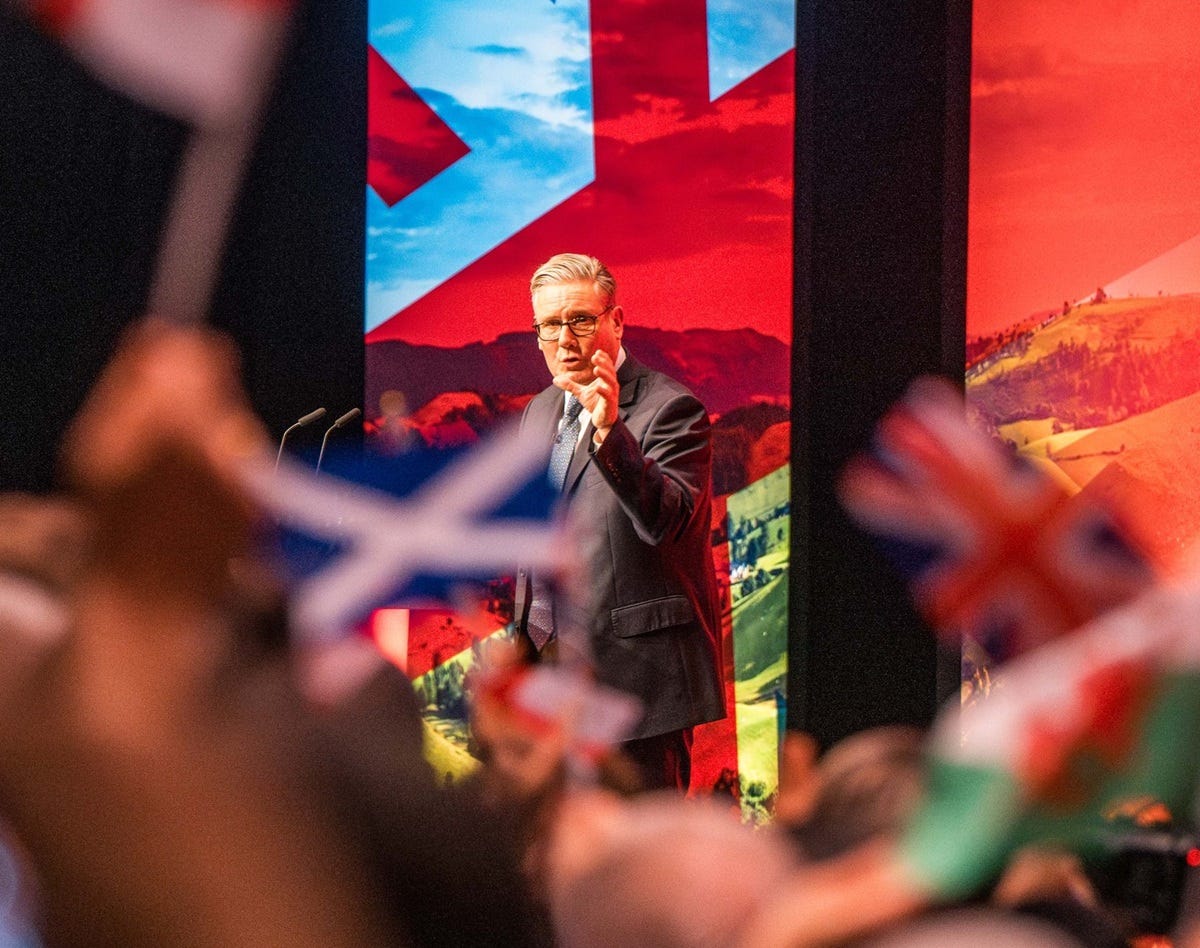Our Labour Party Conference Notebook: A Keir induced vibe shift?
From digital IDs to wealth taxes the topics being tackled in Liverpool
Arriving at Labour Party Conference in Liverpool on Sunday, I was greeted by the sound of protest drums. Two separate crowds had gathered to make their voices heard over the proscription of Palestine Action, and the government’s recently announced plans for digital ID.
The latter policy was on everyone’s lips on Sunday. But the general consensus of the people The Lead spoke to wasn’t that the policy was necessarily bad, but that the communication strategy was off.
Labour’s big problem? Communication
Poor communications was a source of dismay for almost every member we spoke to. Members told The Lead that the government had managed to “set the agenda but not the narrative,” and had been beholden to the “Reform Media Machine”. This, they believed, has cast a shadow on Labour’s genuine successes, some of which – like the progress on the Hillsborough Law – were finally shouted about at this year’s conference. At conference, members were buoyed by the enthusiasm behind the cabinet’s speeches, particularly the chancellor, who pledged to put a library in every primary school and many expressed hopefulness ahead of Starmer’s speech on Tuesday.
A glimmer of hope
That hopefulness exploded into elation after the Prime Minister took to the stage. Addressing a packed auditorium, Starmer took a firm stance against Reform and, as one member put it “finally called racism what it was: racism.” His message that “we aren’t going to stand for” Reform’s “grievance politics” and stirring of division did a lot to address worries about poorly thought out communications. It felt like a refusal, finally, to play Farage’s tired game.
Members said they were “won over” by the speech, saying this was the Prime Minister at his “most inspired, most energetic and clear in his vision.”
What did you make of Starmer’s speech? Let us know in the comments
Elsewhere at this year’s conference, the spectre of Farage loomed large.
The threat of the far right
A panel talk called Exposing the far right: using the media to counter hate and disinformation, hosted by 89up, saw our Westminster Editor Zoë Grünewald say that this was the most important topic of the conference. Speaking to Havana Marking, a documentary filmmaker who directed the film Undercover: Exposing the Far Right, Joe Mulhall, director of research at Hope Not Hate, and Southport MP Patrick Hurley, Zoe asked about how campaigners, journalists and politicians can collaborate to better fight the right.
Marking said that Labour needed to do better to not “alienate” activists and Hurley warned the media against turning against Labour when they’re in power. Meanwhile, Mulhall emphasised the need for local action and organising from everyone, including the public.
At a roundtable discussion about Violence Against Women and Girls and the experience of Black, minoritised, and migrant women hosted by Women for Refugee Women and featuring speakers Andrea Vukovic, Women for Refugee Women’s co-director, Sanskriti Sanghi, Head of Policy at Southall Black Sisters and Gisela Valle the Director of Latin American Women’s Rights Service, we heard how the hostile environment made it impossible for some women to come forward about abuse, and how the current rise of the far right threatens to further entrench hard line stances on immigration which harm the most vulnerable.
Wealth tax now?
Although Starmer sounded a slightly sceptical note on the concept during his speech, a wealth tax was a prominent theme on the fringe of this year’s conference.
At a panel hosted by the campaign group War on Want, experts discussed the best ways to implement a wealth tax. Dr Dhananjayan Sriskandarajah, of the New Economics Foundation, proposed the introduction of an “extreme wealth line” which could help to inform policies, while MP Bell Ribeiro-Addy expressed the need to be “crystal clear” on what a wealth tax is and who it impacts, noting - interestingly - that communicating this effectively would be vital in gaining public support.
Finding the right gear Keir?
From the need for more practical solutions to the housing crisis to the government dragging its feet on its VAWG white paper, it’s clear from this year’s conference that there’s a lot of work to be done.
While Starmer’s speech was light on concrete deliverables, he did offer one thing that seems to have been lacking recently: confidence, and a sense that Labour has, finally, found its voice. ■
About the author: Ella is a freelance journalist specialising in worker’s rights, housing, health, harm reduction and lifestyle. You can find her work in Prospect Magazine, Dazed, Observer Magazine, Women’s Health and - most importantly - here at The Lead.





I appreciated the "taking back the flag" element & the denial that patriotism was the prerogative of the Far Right. I was appalled by the reference to wealth tax as being the approach of "snake oil salesmen," which conflated a practical financial solution to the state of the nation, with the sound-bites of Reform & others. I've voted Labour for over 50 years & was at one time a card carrying Party activist & voluntary election agent at the height of Thatcher's Britain, in one of the most right-wing constituencies in the UK. There is no way I'd vote Labour in the form it currently takes.
I will never vote Labour again. I’ve been Labour all my life but not anymore. A prime minister leads but Kier Starmer doesn’t. He’s a weak bully, he has descended into the gutter taking his party with him. He has incited trouble by using the racist card. He is bizarre